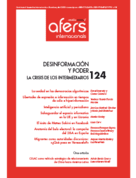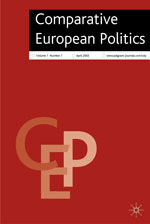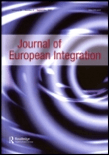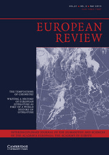
Journal of Contemporary European Research
Scope & Guideline
Connecting Ideas in Political Science and International Relations
Introduction
Aims and Scopes
- Interdisciplinary Analysis of European Integration:
The journal emphasizes the integration of various disciplinary perspectives, including political science, sociology, economics, and cultural studies, to provide a holistic understanding of European integration processes. - Critical Examination of EU Policies and Governance:
A core focus is on critically analyzing EU policies, governance structures, and their effects on member states and beyond, particularly in the context of current challenges such as populism, migration, and economic governance. - Regional and Global Perspectives:
The journal explores the interplay between European dynamics and global phenomena, including EU relations with the Global South, regional transformations, and international cooperation. - Decolonization and Inclusivity in European Studies:
An emerging area of focus is on decolonizing European studies, advocating for diverse, inclusive approaches that challenge traditional narratives and promote epistemic justice. - Impact of Social Movements and Civil Society:
The journal highlights the role of social movements, civil society, and non-state actors in shaping EU policies and public perceptions, reflecting a bottom-up perspective on governance. - Educational Approaches to European Studies:
There is a significant emphasis on pedagogical innovations in teaching European studies, exploring how educational frameworks can adapt to changing political and social landscapes.
Trending and Emerging
- Decolonization of European Studies:
A significant trend is the exploration of decolonization within European studies, advocating for a critical reassessment of Eurocentric narratives and promoting diverse perspectives in research and teaching. - Impact of Populism and Technocracy:
The journal increasingly addresses the tensions between populism and technocracy within the EU context, analyzing their implications for governance, citizen engagement, and democratic legitimacy. - Social Justice and Health Inequalities:
Emerging discussions on social justice, particularly in relation to health inequalities exacerbated by the COVID-19 pandemic, highlight the need for equitable policy responses within the EU framework. - Educational Innovations in European Studies:
There is a growing emphasis on innovative educational practices and curricula that adapt to the evolving landscape of European integration and promote critical thinking among students. - Intersectionality in European Politics:
The journal is also focusing more on intersectional approaches that consider how various identities and social categories intersect in shaping political dynamics and policies in Europe. - Integration of Global South Perspectives:
A notable trend is the increasing integration of perspectives from the Global South, reflecting a broader understanding of Europe's role in global affairs and its historical connections.
Declining or Waning
- Traditional State-Centric Analyses:
There is a noticeable decline in papers that adopt a purely state-centric approach to European studies, as the journal increasingly embraces more nuanced perspectives that consider non-state actors and transnational networks. - Narrow Economic Focus:
Previous issues with a strong emphasis on economic metrics and fiscal policies are less common, reflecting a broader interest in socio-political and cultural dimensions of European integration. - Conventional Security Studies:
Themes centered exclusively on traditional security studies and military dimensions of EU policy are becoming less frequent, as the journal pivots towards more holistic and interdisciplinary frameworks. - Static Historical Analyses:
There is a reduced emphasis on static historical analyses of EU development, with a shift towards dynamic and contemporary issues that address current challenges and transformations.
Similar Journals

Ankara Avrupa Calismalari Dergisi-Ankara Review of European Studies
Exploring the Dynamics of European IntegrationAnkara Avrupa Calismalari Dergisi - Ankara Review of European Studies is a peer-reviewed open-access journal published by the Ankara University European Union Research Centre since 2001. With its focus on European studies, this journal serves as a critical platform for researchers, professionals, and students who are exploring the multifaceted aspects of European integration, policies, and transnational dynamics. The journal aims to foster interdisciplinary dialogue by publishing high-quality research articles, reviews, and case studies that contribute to a deeper understanding of Europe’s evolving socio-economic and political landscapes. As an influential resource within the academic community, Ankara Review of European Studies encourages contributions that span across various disciplines, thus enhancing its role in shaping European studies in the contemporary research landscape.

Revista CIDOB d Afers Internationals
Fostering collaboration and insight in international affairs.Revista CIDOB d Afers Internationals is a distinguished academic journal published by FUNDACIO CIDOB, specializing in the fields of Political Science and International Relations. Since its establishment, the journal has embraced an Open Access model, allowing unrestricted access to its content since 1998, thereby fostering global dissemination and collaboration among researchers and professionals. Based in Barcelona, Spain, the journal is recognized for its rigorous scholarship, achieving a Q2 quartile ranking in the 2023 category of Political Science and International Relations. With a Scopus rank of #361 out of 706 in the relevant field, it operates within an impactful academic framework that encourages innovative thought and analysis from its contributors. The periodical hosts a broad array of articles that delve into contemporary global issues, making it an indispensable resource for students, academics, and practitioners seeking to deepen their understanding of international affairs. As the journal looks ahead, it continues to evolve, converging academic insight from 2016 to 2024 and beyond, inviting scholars to contribute to the ever-expanding discourse on international relations.

Revista General de Derecho Europeo
Fostering Dialogue in European Legal StudiesRevista General de Derecho Europeo is a prestigious academic journal dedicated to the study of European law, published by IUSTEL, a notable publisher recognized for its commitment to legal scholarship. This journal serves as a vital platform for the dissemination of cutting-edge research, fostering dialogue among scholars, practitioners, and policymakers in the field of European legal studies. With an ISSN of 1696-9634, it provides no-cost access to a diverse range of articles, ensuring that the latest developments in European jurisprudence are readily available to a broad audience. Although specific impact metrics such as the H-index are not detailed, the journal’s emphasis on quality and relevance positions it as an essential resource for anyone engaged in exploring the complexities of European law, its implications, and its evolution within a global context. Revista General de Derecho Europeo not only contributes to academic discourse but also equips its readers with critical insights necessary for navigating contemporary legal challenges in Europe.

TalTech Journal of European Studies
Exploring the intersections of history, law, and society.TalTech Journal of European Studies, published by SCIENDO, is a distinguished Open Access journal dedicated to advancing the fields of History, Law, Political Science, and Sociology. Since its inception in 2013, this journal has become a crucial platform for scholarly discourse, catering to an international audience interested in the complexities of European studies. Registered under ISSN 2674-4600 and E-ISSN 2674-4619, the journal is peer-reviewed and aims to disseminate high-impact research findings that drive forward academic inquiry and practical applications within its diverse scopes. With a notable classification in the Q4 quartile across various categories, including History, Law, and Political Science, it holds its ground against global standards, evidenced by its Scopus rankings. The journal not only supports the academic community by offering a platform for innovative research but also strengthens collaborative efforts to address contemporary challenges in European contexts. The accessibility of its content makes it a vital resource for researchers, professionals, and students seeking comprehensive insights into European affairs.

Politique Europeenne
Shaping the Future of Political Studies in EuropePolitique Europeenne, published by EDITIONS L HARMATTAN, is a distinguished academic journal dedicated to the fields of Political Science, International Relations, and Sociology. With an ISSN of 1623-6297 and an E-ISSN of 2105-2875, this journal serves as a vital platform for the dissemination of scholarly research and critical discourse on European political dynamics. Currently classified in Q3 quartile rankings in both Political Science and International Relations, and Sociology, it aims to foster interdisciplinary dialogue and enhance understanding of contemporary political issues across Europe. As of 2023, Politique Europeenne has established itself within the Scopus rankings, standing at the 38th percentile among its peers. Although it does not offer Open Access, its contributions are invaluable for researchers, professionals, and students seeking to engage with pressing political paradigms and theories through its comprehensive articles and reviews. With coverage extending from 2017 to 2024, the journal is poised to continue shaping the academic landscape and encouraging impactful discussions in political studies.

Intersections-East European Journal of Society and Politics
Innovative Insights into the Heart of Eastern European PoliticsIntersections-East European Journal of Society and Politics is a pivotal resource in the fields of Law, Sociology, and Political Science, published by the prestigious CENTRE SOCIAL SCIENCES, HUNGARIAN ACAD SCIENCES. Since its inception in 2015, this journal has been dedicated to exploring the complexities of social and political phenomena within Eastern Europe, making it an essential platform for scholars, practitioners, and students alike. With a focus on fostering interdisciplinary dialogue, it publishes innovative research that critically addresses pressing societal issues and challenges. Despite its current quartile ranking of Q3 in both Law and Sociology and Political Science, the journal's commitment to high-quality scholarship is evident through comprehensive peer-review processes. Accessible to a global audience, this journal aids in the dissemination of vital knowledge and serves as an invaluable asset for anyone seeking to advance their understanding of East European socio-political dynamics.

Comparative European Politics
Unveiling the Complexities of European PoliticsComparative European Politics is a leading academic journal dedicated to the nuanced exploration of political systems, policies, and behaviors across Europe. Published by Palgrave Macmillan Ltd, this esteemed journal has carved out a significant niche in the study of Political Science and International Relations, holding a prestigious Q1 ranking in its field as of 2023. The journal is recognized for its rigorous peer-reviewed articles that contribute to the advancement of knowledge and understanding in the discipline, making it an essential resource for scholars, practitioners, and students alike. With an impressive Scopus rank placing it in the 82nd percentile among its peers, Comparative European Politics provides a platform for innovative research and critical discussions, ultimately aiming to shape policymaking and theoretical frameworks across Europe. While currently not an open-access journal, it continues to offer various access options to ensure its findings are disseminated widely, further amplifying its impact on contemporary political discourse.

European Security
Elevating Understanding of Contemporary Security ChallengesEuropean Security is a leading interdisciplinary journal published by ROUTLEDGE JOURNALS, TAYLOR & FRANCIS LTD, dedicated to advancing the understanding of security issues within the realms of Political Science and International Relations. With an impressive Impact Factor and a Q1 ranking in its field as of 2023, this journal has solidified its position as an influential platform for scholars and practitioners alike, ranking #93 out of 706 in the Scopus database. Since its inception in 1992, European Security has provided a forum for original research, analytical essays, and review articles that explore the complexities of security, conflict, and cooperation in the European context and beyond. The journal's commitment to high-quality scholarship is reflected in its rigorous peer-review process and the diverse perspectives it fosters. Although offering subscription-based access, the content within is invaluable for anyone engaged in the study of contemporary security challenges. Whether you are a researcher, professional, or student, European Security is essential reading for deepening your understanding of the dynamic and evolving landscape of international security.

Journal of European Integration
Bridging Research and Policy in EuropeJournal of European Integration is a leading academic journal dedicated to the study of European politics and the dynamics of European integration. Published by Routledge Journals, part of the esteemed Taylor & Francis Ltd, this journal has established itself as a premier outlet for high-quality research, reflected in its Q1 category rankings in both Political Science and International Relations, as well as in Sociology. With a robust publication history spanning from 1977 to 2024, it offers vital insights into the complexities of political structures and societal impacts within Europe. Notably, it ranks in the 95th percentile in Political Science and International Relations and the 92nd percentile in Sociology, presenting a significant platform for scholars and practitioners alike. Although it does not currently offer Open Access options, the journal's comprehensive content serves as an essential resource for those engaged in understanding contemporary European issues and policy debates. Researchers, professionals, and students will find the Journal of European Integration to be an indispensable source of knowledge and academic discourse.

European Review
Exploring Europe's Dynamic LandscapeThe European Review, published by Cambridge University Press, serves as a vital platform for scholarly discourse in the fields of Geography, Planning and Development as well as Political Science and International Relations. Since its inception in 1993, this journal has contributed significantly to the academic community, providing a comprehensive review of pivotal issues and emerging trends across Europe and beyond. With an impressive H-Index and ranking in the Q3 category for both Geography and Political Science as of 2023, the European Review is highly regarded among researchers and practitioners interested in interdisciplinary methodologies and innovative research approaches. Although it is not an open-access publication, it offers subscribers access to a wealth of meticulously peer-reviewed articles, making it indispensable for those striving to keep abreast of the latest developments in these dynamic fields. The journal's commitment to fostering knowledge exchange ensures its importance as a resource for students, professionals, and researchers alike.